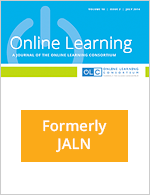Providing Service Innovations to Students Inside and Outside of the Online Classroom: Focusing on Student Success
While institutions recognize the need to provide online student support services, the most effective approaches for developing and delivering these services are not always clear. The need to support students inside and outside the online classroom calls for collaborative efforts from many constituencies. The articles in this volume illustrate good practices in providing student-centered service innovations designed to improve academic success and retention.

